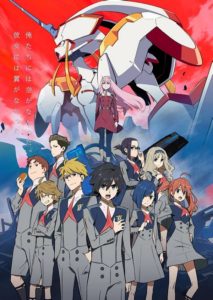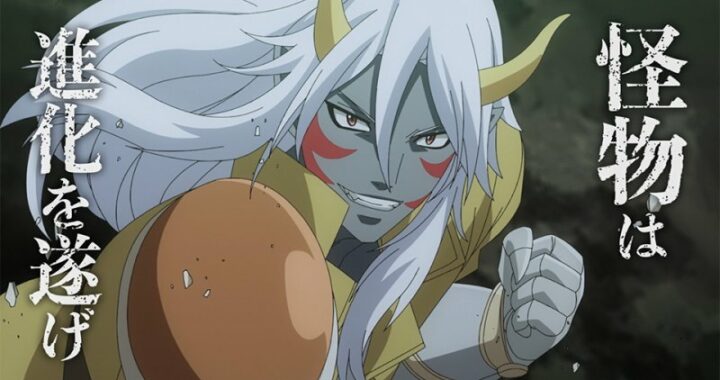
This year’s Crunchyroll Expo had quite a few special guests, including the creative staff behind Darling in the Franxx. Director Atsushi Nishigori, character designer Masayoshi Tanaka, and producer Yuichi Fukushima did a press conference to answer questions from journalists from a variety of outlets. Here’s the report (my questions are in bold):
Question: Whose idea was it to introduce Zero Two by her bursting out of the water with a fish in her mouth?
Atsushi Nishigori: We had our initial brainstorming session and we were like “We kind of want that boy-meets-girl aspect, then how about the boy-one of the epitomes is ‘naked boy meets naked girl’ so okay let’s have them in the water. If she’s coming out of water, we need something humorous yet scary that has a lot of impact-okay, we’ll go with a fish.
Q: With how many anime made today are adaptations, was it difficult to get approval for an anime original like Franxx?
AN: Not so much, because Mr. Toba, the producer was like “leave it to me, I’ll make it happen.” So the staff, including the director, was like “okay, I’ll do whatever I want, then!” A part of the plan was using big names like Tanaka-san and Imaishi-san from Trigger so fans would say “Look at all these great staff that’s here, you want to use this, right?” So that’s how they got approval. It was pretty easy to get the project going.
Q: This question is for Mr. Tanaka. The design of 02 seems pretty important, it was really important for the series. How much creative freedom did you have designing her, and with a character like that where so much of the marketing is going to revolve around that particular character?
Masayoshi Tanaka: So I had the final designs, but it was more of a brainstorming session, so we took good parts from a lot of different people. One thing that we had in consensus was that we need to have 02 standing out.
Q: If you could recreate the sort of magic and story around Darling in the Franxx, what genre would you do it in and why would you choose that genre?
AN: It’s basically anything goes. So long as there’s that aspect of the dorm, the co-op living, the children supporting each other without parents, because that was basically the underlying theme for the series as a whole. So even if it was psychic battles or just regular school, as long as there’s that one house where the main characters live together and support each other, then it would be any genre.
Q: I have a question for Tanaka-san. You’re credited as being both the character designer and chief animation director. That sounds like a lot of work, how did you manage to balance all of that?
MT: There’s two parts. One part is I would try to alternate, like “This week I’m doing design, and next week I’m doing animation director.”
Yuichi Fukushima: You work really fast!
MT: Yeah, I’ll take that, I work really fast.
MT: Everything is solved if I work fast.
Q: How was the feedback loop with Trigger during the production of Franxx?
AN: I was basically the mediator, in that there weren’t that many times where A-1 would ask Trigger or Trigger would ask them, because we actually split up the actual production on a more episode by episode basis. So, the episodes Trigger worked on, if they had any questions they’d come to me. And any A-1 episodes, if they had any questions, they come to me. So everything came through me, so it wasn’t much of a feedback loop. All feedback leads to the director.
Q: This is for Tanaka-san. Can you describe any thematic elements you brought to the characters? For example, Ichigo’s blue, or Zero Two’s more red, or say, Zero Two’s horns. What kind of things did you try to instill into them?
MT: The color is more of a directorial decision than a design decision. So it’s more of a decision with the actual production in mind, because most of the designs were actually brainstormed, it’s not like I personally had a theme or anything; it was a group decision at brainstorming sessions. One thing I kept in mind was how easy is it for me to draw when we’re in actual production.
AN: A lot of the characters have the element of me thinking “I want Tanaka-san to draw this, so can you draw something like this.” So it was more of a directorial thing. So I’m like “I’m totally looking forward to what these designs are, I’m the one that really wants to see this.”
Q: The gender politics in the show were quite controversial, particularly the relationship between Mitsuru and Kokoro. I was wondering what message you wanted to communicate with these gender politics and what reaction you expected from it?
AN: So basically gender politics differ by country, or by social circle, so you can’t say “this is the gender politics” or anything. It’s just that I wanted to express that there are different ways of thinking, different pairings. Everyone closes in on Mitsuru and Kokoro, but that’s not the one pairing, the one theme, that I wanted to express throughout the series. I just wanted the kids in the show to have variations, not just a boy and a girl, like how Ikuno chose a path that’s not cisgender [sic], so it’s the whole concept of being able to choose your orientation and sexuality, and the whole bit with Mitsuru and Kokoro was not exactly ingrained from the initial stages of production. The character just evolved during the production process. So it’s not like I was set on conveying that one message, though everyone seems to harp on it.
AN: And it seems like, it probably became more focused because of the contrast between Hiro and Zero Two, who chose a path to stay together and basically risking their lives, they’re prepared to die, and on the other hand you have Mitsuru and Kokoro on Earth saying “We’re going to have kids, we’re going to be fruitful and multiply, and create life.” So that contrast between life and death might be an issue, why everyone looks on that particular couple more than others.
Q: We think Darling in the Franxx was an incredible piece of science fiction, in that it drew influences from Brave New World, 1984, and The Handmaid’s Tale. Is that because the audience was more sophisticated, or are those elements because we want to raise the sophistication of the audience?
AN: It’s nothing super complicated or sophisticated. It’s more like I had my favorites growing up, like Evangelion, but the current generation, the younger generation, didn’t really experience what people in their 30s and 40s have experienced through classic anime. And it’s kind of like, I want them to feel the same way I did when I was younger. So it’s not being too picky about things, I just filled the show with everything I love.
Q: What else about the show changed during production? Did you have all the twists planned out from the start, or did it change over time?
AN: So basically there’s key episodes, such as episode 13, that we pre-determined how they’re going to do things, but everything else just was on the fly. Like “Hey, the viewers really liked this one, let’s bring it back at a later episode” or “we can use this as a plot point to evolve.” We added a lot of these plot points so that there would be a lot of talk between the viewers, so that there would be more of a cliffhanger like “Oh, we have to see the next episode to see how this is going to turn out.”
Q: So your experience on the show, you took a lot of feedback from it, it generated a tremendous amount of conversation, Mr. Fukushima dealt with a little bit of harassment as a result of it. Were you taken by surprise by the amount of conversation that you managed to generate just with this show, and would you experience change the way your fans and your audience in the future?
YF: So there’s not going to be that much change, except that the reaction for episode 14 was most unexpected. Episode 13, there was a little bit of hubbub, episode 14, everything blew up, but it was mostly from overseas. Not many Japanese people expressed hatred, but we got a lot of hate mail coming from America and Europe. It was very unexpected and we were taken by surprise, but it’s not really going to change our train of thought. And especially because we were more surprised with the feedback on episode 14 because it died down by episode 15.
Q: I was talking with Studio Trigger, and they said they were up for a sequel if our director is willing to take on a sequel.
AN: My mind is completely emptied out. Over time, if my passion wells up and there’s qualified talent that wants to come a long, then maybe.



